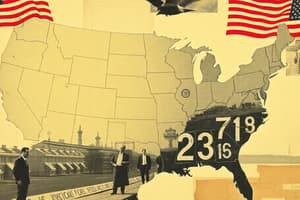Podcast
Questions and Answers
What is foreign policy?
What is foreign policy?
A country's policies towards another country.
What is imperialism?
What is imperialism?
Extending a country's power and influence by diplomacy or force.
Why did imperialism become important?
Why did imperialism become important?
It became important to American foreign policy after the U.S. won the Spanish-American War of 1898.
What are the four reasons for expansion?
What are the four reasons for expansion?
Who is Admiral Alfred Thayer Mahan?
Who is Admiral Alfred Thayer Mahan?
What were Anti-Imperialists?
What were Anti-Imperialists?
What was America's involvement in Hawaii?
What was America's involvement in Hawaii?
What were the results of Hawaiian annexation?
What were the results of Hawaiian annexation?
Flashcards are hidden until you start studying
Study Notes
Foreign Policy
- Defines a nation's approach towards others, aimed at promoting economic and military interests.
Imperialism
- Involves expanding power and influence through diplomacy or military force.
Importance of Imperialism
- Gained significance in American foreign policy post Spanish-American War (1898).
Reasons for Expansion
- Need for Raw Materials and Markets: Industrial growth required resources and markets for products.
- Strategic Reasons: Establishing naval bases globally to enhance naval power and safeguard U.S. interests.
- Nationalism: Expanding territory as a demonstration of national strength.
- Attitudes Toward Others: Superiority beliefs (Social Darwinism) justified imperialism as a "White Man's Burden" to civilize others; some viewed it as a mission to aid and convert.
Admiral Alfred Thayer Mahan
- Authored "Influence of Sea Power Upon History," arguing for a robust navy to achieve world power status and advocating for naval bases for trade support. Known as the Father of the Modern Navy.
Anti-Imperialists
- Opposed the imposition of colonial rule, believing it contradicted self-government principles. Formed the American Anti-Imperialist League in 1898 with notable members like Mark Twain and Andrew Carnegie.
America in Hawaii
- Hawaii served as a critical fueling station for Pacific shipping. American settlers established sugar and pineapple plantations. Missionaries aimed to convert native Hawaiians. American landowners instigated a rebellion that overthrew Queen Liliuokalani, leading to a provisional government under Sanford B. Dole. President Cleveland denied the annexation request, believing it lacked popular support. Dole governed until Hawaii's annexation from 1900 to 1903.
Results of Hawaiian Annexation
- Hawaii was annexed by President McKinley in 1898, and a naval base was established thereafter. Hawaii remained a territory until it achieved statehood in 1959.
Studying That Suits You
Use AI to generate personalized quizzes and flashcards to suit your learning preferences.




